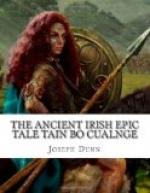[a] Literally, “Habebit amicitiam fermoris mei.”
Thereupon the messengers fared forth to the house of Dare son of Fiachna. This was the number wherewith macRoth went, namely, nine couriers. Anon welcome was [W.99.] lavished on macRoth in Dare’s house—fitting, welcome it was—chief messenger of all was macRoth. Dare asked of macRoth what had brought him upon the journey and why he was come. The messenger announced the cause for which he was come and related the contention between Medb and Ailill.
“And it is to beg the loan of the Brown Bull of Cualnge to match the Whitehorned that I am come,” said he; “and thou shalt receive the hire of his loan, even fifty heifers and the Brown of Cualnge himself. And yet more I may add: Come thyself with thy bull and thou shalt have of the land of the smooth soil of Mag Ai as much as thou ownest here, and a chariot of the worth of thrice seven bondmaids and enjoy Medb’s friendship to boot.”
At these words Dare was well pleased, and he leaped for joy so that the seams of his flock-bed rent in twain beneath him.
“By the truth of our conscience,” said he; “however the Ulstermen take it, [1]whether ill or well,[1] this time this jewel shall be delivered to Ailill and to Medb, the Brown of Cualnge to wit, into the land of Connacht.” Well pleased was macRoth at the words of the son of Fiachna.
[1-1] Stowe and Add.
Thereupon they were served, and straw and fresh rushes were spread under them. The choicest of food was brought to them and a feast was served to them and soon they were noisy and drunken. And a discourse took place between two of the messengers. “’Tis true what I say,” spoke the one; “good is the man in whose house we are.” “Of a truth, he is good.” “Nay, is there one among all the men of Ulster better than he?” persisted the first. “In sooth, there is,” answered the second messenger. “Better is Conchobar whose man he is, [2]Conchobar who holds the kingship of the province.[2] And though all the Ulstermen [W.120.] gathered around him, it were no shame for them. Yet is it passing good of Dare, that what had been a task for the four mighty provinces of Erin to bear away from the land of Ulster, even the Brown Bull of Cualnge, is surrendered so freely to us nine footmen.”
[2-2] Stowe and Add.
Hereupon a third runner had his say: “What is this ye dispute about?” he asked. “Yon runner says, ‘A good man is the man in whose house we are.’” “Yea, he is good,” saith the other. “Is there among all the Ulstermen any that is better than he?” demanded the first runner further. “Aye, there is,” answered the second runner; “better is Conchobar whose man he is; and though all the Ulstermen gathered around him, it were no shame for them. Yet, truly good it is of Dare, that what had been a task for four of the grand provinces of Erin to bear away out of the borders of Ulster is handed over even unto us nine footmen.” “I would not grudge to see a retch of blood and gore in the mouth whereout that was said; for, were the bull not given [LL.fo.55a.] willingly, yet should he be taken by force!”




